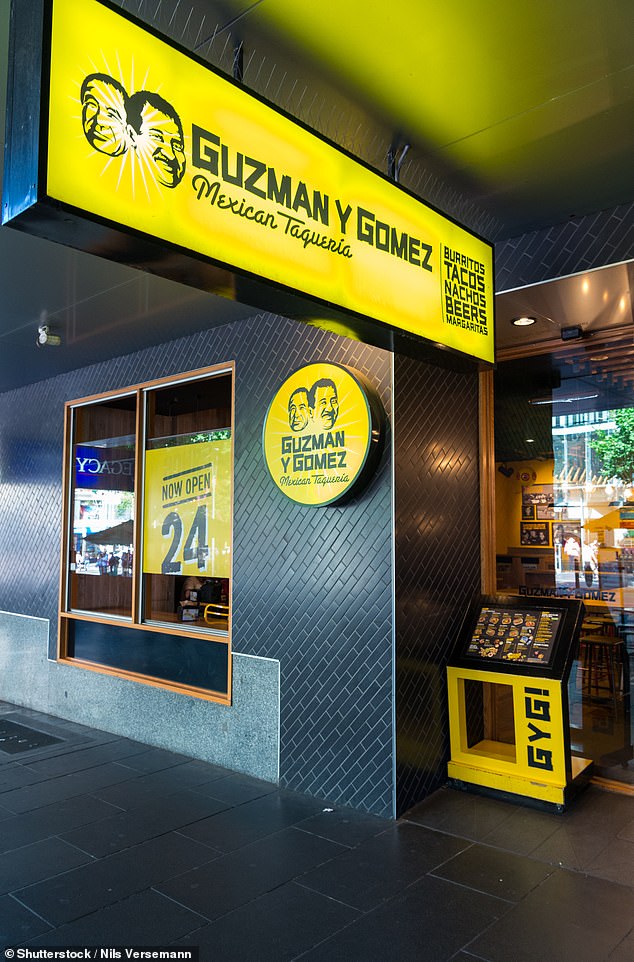Guzman y Gomez bombshell as Australia’s favourite Mexican fast food restaurant is rocked by bombshell allegations about the REAL backstory of its logo – and exec’s comment: ‘We don’t give T-Shirts to fat people’
- Mexican fast food chain accused of discrimination
- Consultants sued Guzman y Gomez for $152 million
- The lawsuit was settled for $1.5 million
- GYG and consultants dispute the logo’s backstory
Former Guzman y Gomez consultants have accused the Mexican fast-food chain’s leadership team of racism and ageism, claiming that one of its marketing managers once told staff “we don’t give T-shirts to fat people.”
The allegations against the company, which was founded in Sydney in 2006 by Steven Marks and Robert Hazan, have surfaced in a recent lawsuit in California over the brand’s failed plan to expand in the United States.
A group of fast food executives, including Greg Creed, who offered consulting services to the company, were sued Guzman y Gomez for the equivalent of $152 million.
Mr. Creed and his team alleged in the filing that Guzman y Gomez’s leadership team was “biased against individuals over the age of 40.”
At the opening of an Illinois store in January this year, a company marketing official allegedly said there were “too many old people coming in” and that “they are not a great face of the brand,” according to court records.
Former Guzman y Gomez consultants have accused the Mexican fast food chain’s leadership team of racism and ageism, with a marketing manager once reportedly telling staff: ‘we don’t give t-shirts to fat people’ (pictured is CEO Steven Marks)
Mr Marks also said: ‘I’m happy to serve them, but I want to see young people in the restaurant.’
Guzman y Gomez also gave away free promotional T-shirts at the store opening.
The marketing officer also allegedly said ‘we don’t give T-shirts to fat people’ in front of Mr Marks ‘who made no effort to correct’.
Mr. Marks also allegedly made discriminatory comments about the ages of some members of the advisory team, the filing said.
He allegedly told one consultant, who was under 40, that he believed the others did not have “the energy to take the brand to the next level.”
The CEO also reportedly told the same consultant that he was looking for employees in their mid-30s who were “energetic.”
An issue was also raised about the fast-food chain’s logo, which features the faces of two men posing as Mr. Guzman and Mr. Gomez, who are supposedly named after the fathers of Mr. Marks’ childhood friends.

At the opening of an Illinois store in January this year, a company marketing official allegedly said there were “too many old people coming in” and that “they are not a great face of the brand,” according to court records.
The team of advisors had advised that the logo “could be considered racist in US markets.”
“Mr. Marks ultimately admitted that the entire story behind the history of GYG’s brand and logo was completely fabricated and false,” the filing said.
“He never met his partner in New York; the names and images used were not based on his alleged Mexican friends as a young child who inspired his love of Mexican cuisine; he never ate at a Mexican family’s home; The images used by GYG US were simply drawings created to make Mexican cuisine culturally appropriate solely for a marketing benefit in Australia.
“Even the names ‘Guzman’ and ‘Gomez’ are completely made up for marketing purposes.”
The lawsuit was settled this month with the equivalent of a $1.5 million payment to the six plaintiffs, along with the repurchase of shares they purchased a year and a half ago.
Guzman y Gomez said that in their 17 years of existence, no customer had ever filed a complaint.
“GYG, Fuller 74 LLC and the other parties have settled on a confidential basis and as such we cannot comment further on the claims,” the company said.
“GYG took steps to dismiss the claims because we did not agree that they had any merit. The parties recognized the investment of time, money and distraction associated with pursuing litigation in the United States and made the decision to move forward and settle the claims.”
Guzman y Gomez also said that Marks has always stated that the logo’s faces were based on the memories of his childhood friends’ fathers and Mr. Hazan’s.
The company said the names and faces “may not be the exact likeness of those people,” but that the people and the story of the company’s founding were real.
